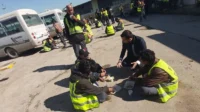Contractor says authorities are withholding funds
Qaladze street workers face salary arrears on eve of Eid celebrations
QALADZE — Workers and cleaners at Bivan Company in Qaladze are reporting distress over wage issues during Ramadan, noting they received only one month’s salary while other employees received two. With the al-Fitr Eid holidays approaching, they are still awaiting their wages, which they claim are lower than those of municipal or security workers.
Hassan Ahmed, a street worker, told 964media, “Our job at Bivan Company is to clean the city. We’re calling on the Kurdistan Regional Government and relevant authorities to pay our salaries because we’re in a dire financial situation, especially during Ramadan. Without donations, we struggled to afford a decent meal.”
Qaladze is located in the Pshdar area of the Sulaymaniyah governorate, close to the Iranian border.
Soran Barze, a supervisor at Bivan, informed 964media that the street workers were paid one salary at the start of Ramadan but are owed two months’ worth of wages. “The delay is because the government hasn’t provided the funds, which prevents us from paying our workers,” Barze said. He added that while other employees received two salaries, the street workers received less and only one payment.
Bivan Company, responsible for cleaning and waste management within the district, has faced rumors of delayed salary payments for months. However, work has continued.
The local municipality oversees Bivan’s operations in Qaladze.
Many of the city’s approximately 150 street workers, earning between 350,000 and 500,000 Iraqi Dinars ($236 to $337), rely solely on this job for income. A significant number of them are physically disabled and unable to find other work.
This is not the first instance of the street workers voicing their concerns. On Dec. 19, 2023, they went on strike for about a week over three months of unpaid wages, leading to significant trash buildup in the city.
A street worker stated to 964media, “It’s been three months since our last paycheck, forcing us to stop working. Many of us have chronic illnesses, and while we’re proud of our work, we expect the government and authorities to recognize our efforts and pay us what we’re owed.”
The financial burden is compounded by the costs associated Eid for food, purchasing new clothes, travel, and hosting expenses, adding to the workers’ distress during this festive but costly period.
Street workers in Raparin protest over unpaid salaries

